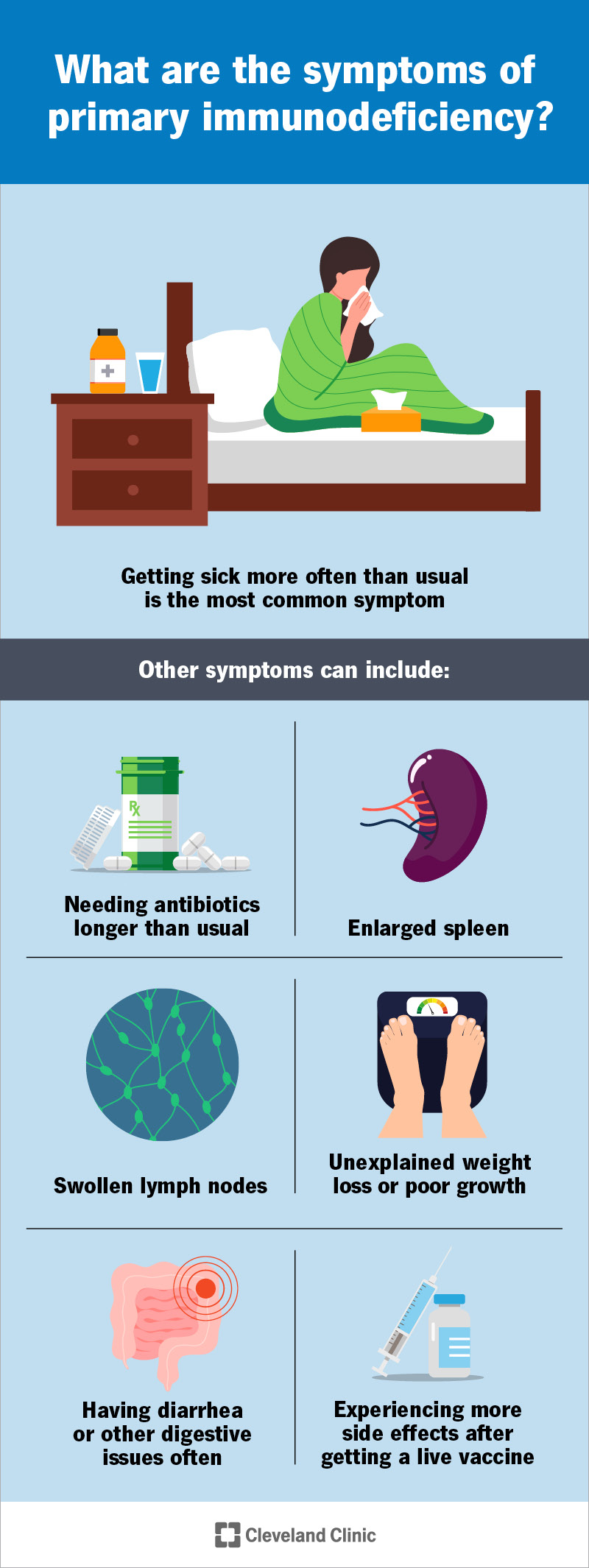Symptoms and Causes

Symptoms of primary immunodeficiency (V体育官网)
Getting sick more often than usual is the most common symptom. You might catch infections more easily than people around you V体育官网入口. And when you do get sick, you may experience more severe symptoms or complications.
You might notice that it takes you longer to recover from an illness than others VSports在线直播. Infections may go away and come back, even after you start a treatment.
Other symptoms can include:
- Needing antibiotics longer than usual
- Enlarged spleen
- Swollen lymph nodes
- Unexplained weight loss or poor growth
- Having diarrhea or other digestive issues often
- Experiencing more side effects after getting a live vaccine
Most people with a PIDD experience symptoms before turning 20. But they can develop at any point in life.
"VSports在线直播" Primary immunodeficiency causes
Genetic changes cause primary immunodeficiencies. They prevent your immune system from developing and working correctly. It might be:
- Less active than it should be
- Missing cells that it usually has
- Completely missing
You can’t control the genetic changes — they happen before you’re born. Which genes are changed will determine the disorder you develop.
Risk factors for these diseases
The changes that cause primary immunodeficiencies often run in biological families. That means if your biological parents or siblings have a PIDD, you may be more likely to have one, too.
These disorders are more common in males.
Diagnosis and Tests
VSports注册入口 - How doctors diagnose these disorders
A healthcare provider will diagnose a PIDD based on a few factors:
- Your medical history (tell your provider if you know you’ve had any infections recently)
- A physical exam
- The symptoms you’re experiencing
- Your family history (tell them if you know someone in your family has a PIDD)
Your provider will probably use a few tests, including:
- Blood tests to look for signs of infections
- Genetic testing to check for changed genes
- Flow cytometry to examine a sample of your immune cells
Every state in the U.S. tests babies for severe combined immunodeficiency (SCID) when they’re born. That’s because SCID is fatal if it’s not treated right away.
VSports - Management and Treatment
VSports注册入口 - How are these disorders treated?
Your healthcare provider will suggest ways to manage and prevent infections. The treatment you’ll need depends on which PIDD you have.
You might need:
- Antibiotics to prevent or treat bacterial infections
- Antivirals for viral infections
- IVIG infusions to boost your immune system’s natural defenses
- A stem cell transplant if you have a risk of life-threatening complications
- Gene therapy that may repair or replace changed genes
When should I see my healthcare provider?
Visit a healthcare provider if you feel like you get sick too often. Everyone gets sick every once in a while. But you know your body better than anyone. You can tell when something doesn’t feel right.
Advertisement
Talk to your provider if you’ve started treatment for a PIDD and it feels like your medications aren’t working. Tell them if you have a fever or infection. They’ll suggest ways to avoid complications.
Outlook / Prognosis
What can I expect if I have a PIDD?
You’ll have to monitor your body for signs and symptoms of infections. And you may need to take medications for the rest of your life. Your healthcare provider will help you understand the best ways to avoid infections, including:
- Washing your hands often (especially after going to the bathroom and before eating)
- Staying up-to-date on the vaccinations your provider suggests
- Getting enough sleep
- Following a healthy eating plan
- Getting enough physical activity
Your loved ones can help you stay safe and healthy, too. Ask them to let you know if they’re sick, feel unwell or have had an infection recently. This can help them avoid accidentally spreading infections when they see you in person.
A note from Cleveland Clinic
Living with a primary immunodeficiency (PIDD) can feel like a lot of work. But you don’t have to do it alone. Your healthcare provider and loved ones can help. Your provider can suggest treatments. They can also recommend a support group if you’re interested in talking to other people with similar experiences. Your friends and family can help you avoid infections and plan safer social gatherings. Remember, having a condition like a PIDD is just a part of your health; it doesn’t define who you are. Only you can do that.
Advertisement
Care at Cleveland Clinic
As your child grows, you need healthcare providers by your side to guide you through each step. Cleveland Clinic Children’s is there with care you can trust.

Last reviewed on 06/20/2025.
Learn more about the Health Library and our editorial process.